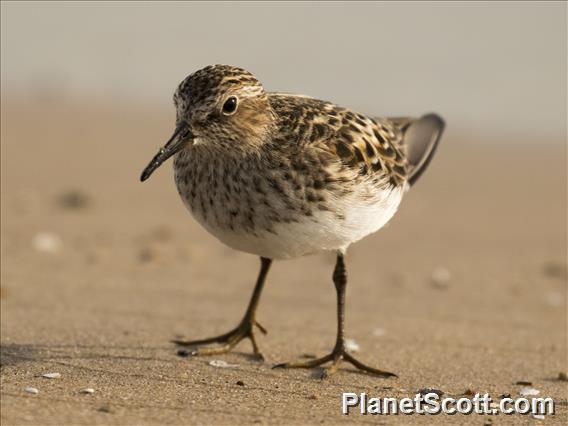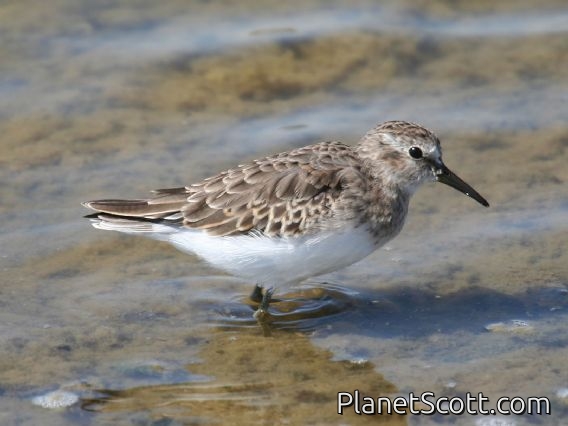Least Sandpiper (Calidris minutilla)

Least Sandpiper (Calidris minutilla)

Least Sandpiper (Calidris minutilla)

Least Sandpiper (Calidris minutilla) September

Least Sandpiper (Calidris minutilla)




×





Least Sandpiper (Calidris minutilla)

Least Sandpiper (Calidris minutilla)

Least Sandpiper (Calidris minutilla) September

Least Sandpiper (Calidris minutilla)
About Least Sandpiper (Calidris minutilla)
- Kingdom: Animals
- Phylum: Chordates
- Class: Birds
- Order: Pelicans
- Family: Sandpipers and Allies
The least sandpiper is the smallest shorebird. The genus name is from Ancient Greek kalidris or skalidris, a term used by Aristotle for some grey-colored waterside birds. The specific minutilla is Medieval Latin for "very small".
Source: Wikipedia
Lifelists
Trips
Visits
-
2005-12-02
Candlestick Park, United States of America× -
2006-04-16
Kern National Wildlife Refuge, United States of America× -
2006-09-23
Don Edwards National Wildlife Refuge - Alviso, United States of America× -
2006-12-01
Isla Floreana - Punta Flores, Ecuador× -
2007-01-10
Heron's Head Park, United States of America× -
2007-04-10
Ejido Lagoon, United States of America× -
2007-10-11
La Mancha, Mexico× -
2008-01-07
Playa de Los Reyes, Mexico× -
2008-02-17
San Jose del Cabo - Estuary, Mexico× -
2008-08-24
Giants Park, United States of AmericaA flock, presumably all least sandpipers, but maybe something else, swooped onto the field in a tight flock and flew around next to home plate for a few minutes before exiting the park.× -
×
-
2009-02-24
Puerto Jiminez, Costa Rica× -
2009-02-25
Corcovado National Park - La Sirena, Costa Rica× -
2009-03-19
Punta Patino, PanamaA large flock of several hundred were seen, but they were too far away to confirm 100%× -
2009-10-01
Crissy Field, United States of America× -
2009-11-22
Palo Alto Baylands, United States of America× -
2009-11-29
Heron's Head Park, United States of America× -
2010-01-03
Sacramento National Wildlife Refuge, United States of America×× -
2012-04-14
Heron's Head Park, United States of America× -
2012-04-14
Pier 94, United States of America× -
2012-07-21
Don Edwards National Wildlife Refuge - Alviso, United States of America× -
2012-08-12
Coyote Point County Park--harbor and marsh, United States of America× -
2012-08-12
Redwood Shores - Radio Road, United States of America× -
2012-08-25
Pescadero Marsh, United States of America× -
2012-09-07
Heron's Head Park, United States of America× -
2012-09-23
Heron's Head Park, United States of America× -
2012-12-13
Heron's Head Park, United States of America× -
2013-03-30
Heron's Head Park, United States of America× -
2013-04-16
Aransas NWR (CTC 037) (Aransas Co.), United States of America× -
2013-04-17
Brazoria NWR (UTC 108), United States of America× -
2013-04-18
Galveston Island, United States of America× -
2013-04-19
Anahuac NWR (UTC 049), United States of America× -
2013-08-05
Heron's Head Park, United States of America× -
2013-12-01
Heron's Head Park, United States of America× -
2014-01-11
Heron's Head Park, United States of America× -
2014-01-14
Candlestick Park, United States of America× -
2014-02-22
Santa Fe Grade, United States of America× -
2014-03-11
Elkhorn Slough, United States of America× -
2014-11-01
Yosemite Slough, United States of America× -
2014-12-27
Heron's Head Park, United States of America× -
2015-01-01
Candlestick Park, United States of America× -
2015-01-02
Pixley NWR, United States of America× -
×
-
×
-
×
-
×
-
×
-
×
-
×
-
×
-
×
-
×
-
×
-
×
-
×
-
×
-
×
-
×
-
×
-
×
-
×
-
×
-
×
-
×
-
×
-
×
-
×
-
×
-
×
-
×
-
×
-
×
-
×
-
×
-
×
-
×
-
×
-
×
-
×
-
×














